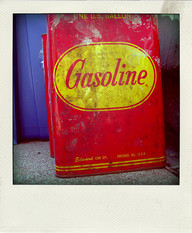
The junkyard is a land of nests. We have bird nests, bees’ nests, and as Dad likes to call my hair—“rats’ nests.” In the makeshift garage behind the house, we found a nest once, under some carpeting that covered the sandy soil. Yellowjackets swept up and out from under the rug.
Dad told me that we’d wait until dark to take care of it. When night fell, we went outside with a flashlight and Dad grabbed a can of gasoline. I aimed the flashlight and stood pretty far back while he lifted a corner of the rug just a little bit. He dumped the gas onto the nest, and we ran away before they could get us. I’m not sure they ever woke up.
In the morning, I went to see the bees. I threw a rock at their home from far away, and when nothing happened, I got closer, and pulled the rug up. Several combs were in there, grey and flaking and wet. The bodies of dead insects numbered in the dozens. I felt bad for them. But they would have stung us anyway, and we’d done what had to be done. I found a glass jar in the house, and put one of the nests inside, to keep a relic of this massacre. There were little white capsules within the comb I kept.
A few mornings later, there were living, moving yellow jackets in my jar. I got freaked out, and covered it with a lid. But they were so small, and there weren’t many, and moved like zombies or the newly born. The only place they could have come from was the comb—they were babies! I put some dandelions and leaves in the jar so they wouldn’t go hungry. But only a few days later, the newborns were dead. I asked Dad what had happened, and he told me that the gas had probably killed them. That was its purpose, after all.
I got rid of the comb. It made me sad to see the babies born and then die. And I didn’t want my home to smell the way theirs did.
Dad told me that we’d wait until dark to take care of it. When night fell, we went outside with a flashlight and Dad grabbed a can of gasoline. I aimed the flashlight and stood pretty far back while he lifted a corner of the rug just a little bit. He dumped the gas onto the nest, and we ran away before they could get us. I’m not sure they ever woke up.
In the morning, I went to see the bees. I threw a rock at their home from far away, and when nothing happened, I got closer, and pulled the rug up. Several combs were in there, grey and flaking and wet. The bodies of dead insects numbered in the dozens. I felt bad for them. But they would have stung us anyway, and we’d done what had to be done. I found a glass jar in the house, and put one of the nests inside, to keep a relic of this massacre. There were little white capsules within the comb I kept.
A few mornings later, there were living, moving yellow jackets in my jar. I got freaked out, and covered it with a lid. But they were so small, and there weren’t many, and moved like zombies or the newly born. The only place they could have come from was the comb—they were babies! I put some dandelions and leaves in the jar so they wouldn’t go hungry. But only a few days later, the newborns were dead. I asked Dad what had happened, and he told me that the gas had probably killed them. That was its purpose, after all.
I got rid of the comb. It made me sad to see the babies born and then die. And I didn’t want my home to smell the way theirs did.

 RSS Feed
RSS Feed
